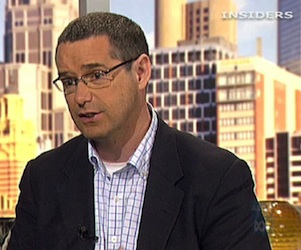Low NBN take-up irrelevant: Conroy

Telstra's $11 billion agreement with the National Broadband Network Company (NBN Co) means that the low sign-up rate for services on the NBN is irrelevant, Communications Minister Stephen Conroy said this morning.

(Screenshot by Josh Taylor/ZDNet Australia)
In Senate Estimates last week it was revealed that roughly 51 per cent of the first 4000 Tasmanian premises offered connection to the NBN had consented to having the fibre installed to their home. NBN Co CEO Mike Quigley said that that, of those, 436 premises (10.9 per cent in total) had ordered services and 262 of those (6.55 per cent in total) now had active services.
Speaking on the ABC's Insiders program this morning, Conroy said that this level of take-up after three months in Tasmania was actually ahead of what was predicted in the KPMG and McKinsey Implementation Study, which was between 6 and 12 per cent in the first 12 months. Yet Conroy said that Telstra's heads of agreement with the government would remove any concerns about the numbers in any case.
"All of the arguments around take-up are irrelevant once we reach the agreement with Telstra," Conroy told Insiders host Barrie Cassidy. "We are closing down the copper network. We are actually transferring every customer who wants a fixed line onto the National Broadband Network."
"So [people are] trying to suggest that one in 10 is somehow a fail mark when it's actually ahead of schedule and irrelevant ultimately because every fixed-line customer transfers onto the National Broadband Network that wants to."
Conroy also rejected suggestions made last week that connecting to the NBN would be expensive for consumers, with some reports suggesting that rewiring costs could amount to thousands of dollars per household.
"We will provide a connection into people's homes and you can plug into that connection and away you go, using an existing Wi-Fi network, using the sorts of technology existing in people's homes today," he said. "Those sorts of figures imply you're fibring your toilet up.
"If you want to watch IPTV on four different screens in four different rooms you might need to do some cabling," he added. "But that's no different to Foxtel, for instance, where they'll give you one connection for their price. If you want Foxtel in a second room you pay $15 a month or so for an extra screen in an extra room.
The business case for the NBN was reviewed by the NBN Co board on Friday, Conroy revealed. He said that some of the key information contained in this business case would be revealed after the government reviews it in the next few weeks.
"I would expect some fairly major information to be made available about the cost, the pricing, the rates of return, all that sort of information to be made public," he said.
The minister dismissed claims that bipartisan support for the network could be achieved if the Productivity Commission gave a glowing analysis for the NBN as part of a private member's bill put forward by the Coalition last week. Conroy said that Shadow Communications Minister Malcolm Turnbull hasn't indicated he would support the network in that case, and said that Opposition Leader Tony Abbott's goal is to "demolish" the NBN project.
"We'd waste money. The [Organisation for Economic Co-operation and Development] are about to complete a major study into broadband productivity, a major study, cost benefit analysis drawn from all across the world," he said. "And so what we have now is demands for more studies and more time wasting."